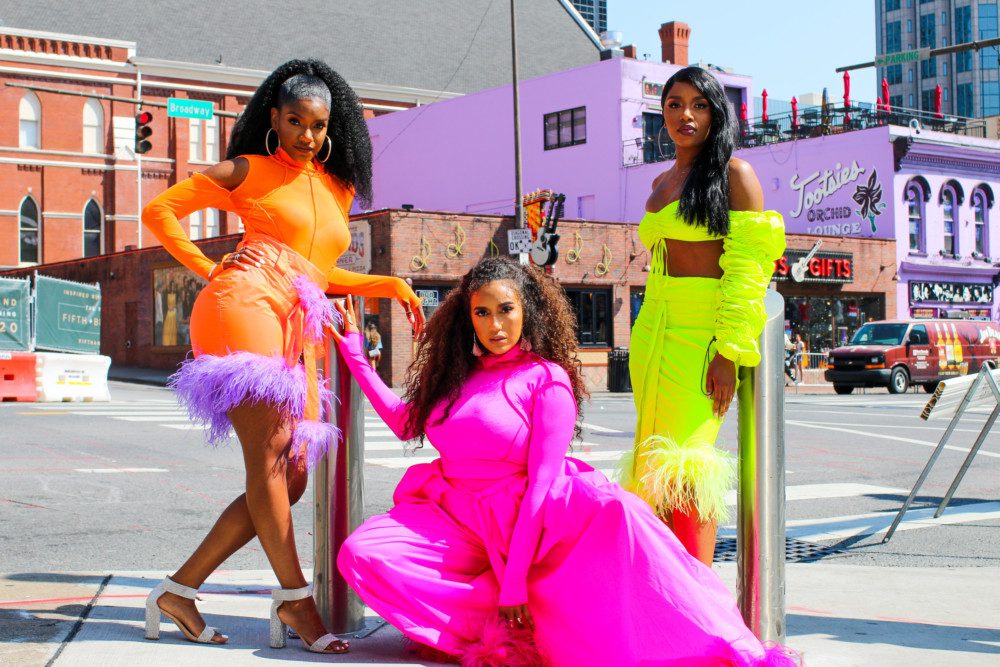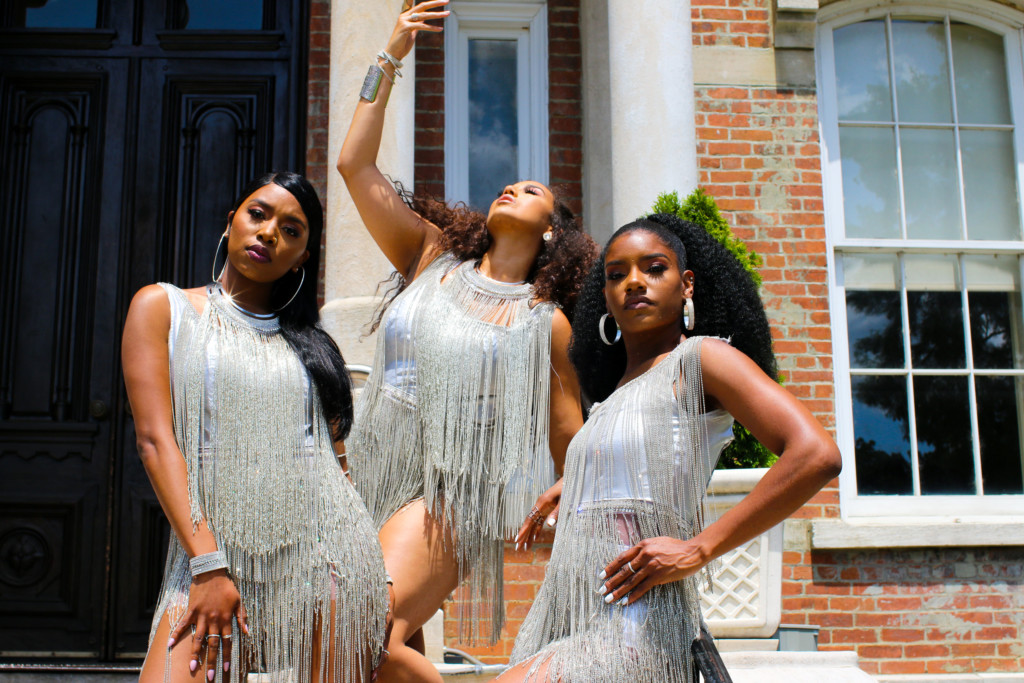
When pressing play on “Costume,” the new single from up-and-coming trio The Shindellas, it’s as much a journey as it is a song.
The genre-blending act of Kasi Jones, Stacy Johnson and Tamara Chauniece begin by transporting us back in time to the 1960s with a spirited introduction that offers glimmers into each woman’s personality: Stacy is mean on the bass, love is Kasi’s middle name and Tam can sing like the best of them. They share these idiosyncrasies over a melody that captures the cinematic sound reminiscent of iconic groups like The Supremes and The Chiffons. But just as you’re reveling in this throwback sound, the beat drops, transforming into a slick R&B jam.
Written and produced by Grammy nominated songwriters and producers Claude Kelly and Chuck Harmony, along with former American Idol contestant and Grammy Award winner Tori Kelly, a close ear to the lyrics reveal that the infectious melody surrounds a powerful message that encourages self-acceptance and the freedom to walk in one’s truth, the trio’s glistening harmonies lifting up such inspiring words, “All we want is love / all we got is us / baby that’s enough / let me see the real you / ain’t gotta wear your costume tonight.”
Kelly and Harmony are co-founders and CEOs of Weirdo Workshop, a Nashville-based artist collective that produces The Shindellas and their own work as groundbreaking duo, Louis York.
Listen to Audiofemme’s exclusive premiere of “Costume” and read our interview with The Shindellas below.
AF: What was your reaction when you first heard “Costume”?
SJ: It’s a really fun song, it’s got a fun beat. It’s one of those songs that I feel like everyone can sing along to. It’s uplifting, it feels like a party song.
KJ: The blended styles, it literally feels like a party song from the ’20s and also from the future, it really is theatrical. It plays with a lot of different parts of our voices, it was like all of us could really sink our teeth into something.
AF: What are listeners going to learn about you through this song?
SJ: They’re going to learn our names, they’re going to know what we bring, our perspectives, we talk about that. And they’re going to learn about this different movement and be encouraged to join that movement and be a part of it, just women singing together about that kind of thing. I don’t think it’s a new thing, but it’s just an encouraging thing that they’re going to learn, encouraged to be close with your sisters and empower your sisters around you.
KJ: It starts with all of our playfulness. We actually introduce ourselves on the song, but I think it’s the most direct of our songs in terms of our actual messaging like self-love, self-respect, self-worth. “You are allowed to be yourself without fear” is our mantra and this song is just talking about being authentically you, and that’s what we are creating. It’s an anthem to all the weirdos.
AF: What do you want listeners to take away when they listen to this song? What message are you trying to convey and how do you hope it impacts them when they hear this song?
KJ: I hope people really feel that we’re embracing everyone’s most authentic self; that you are allowed to be yourself without fear and that that’s what we’re about. I also hope people will hear the song and want to come see it. I hope it reaches through the speaker and then makes them feel like they’re a part of something, like “I can turn this on when I’m feeling lonely or when I need that boost.”
AF: In the context of this song, how do you define the word ‘costume?’
SJ: It means to put on a persona. It can be a literal persona. It could be something as literal as makeup to saying you’re okay when you’re not okay. A costume is something that you’re using to guard yourself. But I feel like we’ve learned when you’re vulnerable, when you’re transparent, that is when people can really empathize and understand you and fall in love with you. So we’re asking everyone to take off their costume, whether it be makeup or it be something that you might find a flaw that you might be hiding and it could be somebody’s encouragement, somebody’s inspiration.
KJ: It makes me think of when we did our Tiny Book Club [an initiative through Weirdo Workshop] on passing and that sometimes your costume is how you pass. You wear a costume to your corporate job or you wear a costume with your family or we have different personas like [Stacy] said or costumes that we put on and maneuver through life. But like we talked about in that conversation, can you be really free if you’re constantly passing? We want people to be free.
AF: One line that stood out to me is “We’re The Shindellas, we’re truth tellers.” How do you define “truth teller?”
TC: I think that a truth teller is someone who understands that you’re flawed, but they are a work in progress, and they are all about sharing that journey with whomever will listen. I think for truth tellers, they just want the truth to be the reality, so they’re willing to basically put themselves and their truth on the line to actually bring in more people so that the truth can actually be the one thing that prevails.
AF: So how do you, The Shindellas, feel that you are truth tellers? What truth are you hoping to share with the world?
KJ: The universal truth. We’re ones that love is and always will be our north star.
SJ: In our music so far that we’ve put out has been nothing but some pretty serious topics wrapped in bubbly sounds and cool harmonies. But a lot of the words and lyrics are honest experiences that we’ve had that, like [Tamara] said, want to share. Our music is a huge reflection of our truth telling.

AF: Do you feel like your truth is reflected in “Costume”?
The Shindellas: Absolutely.
KJ: We all feel like costumes.
SJ: Stacy feels like her Jamaican roots are in “Costume” somehow without even having to force it or make it something that’s super prominent. It feels very real and true in the music.
KJ: That’s so true. I can hear all of the movie musicals that are what made me even want to be a singer and an actor. All those movie musicals and all those vocal performances in the intro and the bridge, that’s my grandma, it’s my childhood, what made me want to even play this way.
TC: I can totally hear my gospel roots because I feel like the entire song we’re testifying. We’re literally preaching but in a way that doesn’t sound so preachy, it actually sounds fun, so it’s a really weird juxtaposition. It’s kind of like what [Kelly and Harmony] coined a “deep fried veggie,” it’s such a fun beat and you kind of don’t even recognize that there’s such an awesome message in it until it’s over and you’re like “wait a minute, what was this experience?” That’s what I really love about it.
AF: Another big mantra for you is “when women come together, powerful things can happen.” How do you feel that you all have become more powerful since coming together?
SJ: For me personally, I’m inspired by these two women. Because we’re going through this together, every time they choose to be their truest self or to speak their truth or to face their fear, it encourages me to do the same. It’s been a magnifier for us. Also, I feel like I’m able to have a bigger voice and reach more people because we’re together and it’s still the same message that I would have been doing by myself, but now I have my sisters and more people can see themselves in us, so we’re able to reach so much more. We’re magnifying our words and our songs and our message by being together.
TC: I think that through this experience, I’ve become more powerful because now that I know that I have two women that are depending on me to be my best self, that is something that causes me to constantly self-reflect and constantly look in the mirror and make sure that I am being my best self when I’m with them because I know that we’re the most powerful when we’re all operating at our maximum potential. Knowing that I now have accountability buddies, it just makes for an incredible journey.




